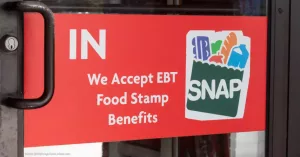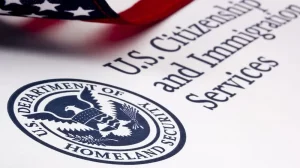Can Ukrainians Accept Public Benefits while on Humanitarian Parole?
Posted on February 10, 2023

Many Ukrainians ask about the consequences on accepting public benefits if they later wish to apply for a green card (lawful permanent residence). Ukrainian humanitarian parolees MAY accept those federal benefits for which they have been approved by law through an act of Congress while they are present on valid humanitarian parole. Read more
Know Your Rights with Immigration and Customs Enforcement (ICE)
Posted on February 8, 2023

All people who are living in the United States have certain rights that are given to them by the U.S. Constitution. This includes citizens, lawful permanent residents, those who are here on a visa, humanitarian parolees, other immigrants, and those who are undocumented. The term "undocumented" refers to a person residing in the United States without legal documentation. This can be people who entered the U.S. without inspection and proper permission from the government, as well as those who entered with a visa or a legal status that is no longer valid. If you or someone you know are approached by Immigration and Customs Enforcement (ICE), know your rights at work, at home, or in public places. Read more
Temporary Protected Status (TPS) for Ukrainians: Background and Requirements
Posted on February 6, 2023

Temporary Protected Status (TPS) is a temporary immigration protection that is provided to nationals of certain countries who cannot return to their home countries due to an ongoing armed conflict, environmental disaster, or other dangerous conditions defined by the U.S. State Department. Individuals who are granted TPS are protected from being removed from the United States.... Read more
Traveling with Children through Uniting for Ukraine
Posted on February 3, 2023

Minor children (children under 18 years old) are only allowed to enter the United States when accompanied by an adult who can verify their legal custody of the child. Thus, children who are traveling to the U.S. under Uniting for Ukraine must be accompanied by at least one parent or legal guardian, and the adult must have proof of legal custody over the child. Read more
Options for Ukrainians with Expiring Humanitarian Parole
Posted on January 31, 2023

Most Ukrainians who came through the U.S.-Mexico border in March and April 2022 were given a “DT” admission class code on their I-94 Arrival/Departure Record and were granted humanitarian parole for one year. Unless they entered the U.S. on or before April 11, 2022, they are not eligible to apply for the current TPS term. For Ukrainians who are eligible for TPS but have not yet applied for or been granted TPS protection, their parole will expire when their I-94 authorized stay expires. Read more
Avoid Scams, Fraud, and Unauthorized Legal Advice about Uniting for Ukraine and Other Immigration Processes
Posted on January 26, 2023

There has been an increase in scams and predatory behavior targeting individuals from Ukraine and other countries who may be considered for parole under the Uniting for Ukraine. USCIS is asking potential sponsors and beneficiaries to be cautious of scams and rumors. Read more
Welcome Corps Private Sponsorship Program for Refugees Announced
Posted on January 20, 2023

The Ukraine Immigration Task Force is excited to announce a new program that hopes to increase the number of refugees admitted from other countries. The State Department just launched Welcome Corps, which represents the first major development in U.S. refugee immigration in a long time. This program will enable Americans to help thousands of people from around the world start new lives in the United States through private sponsorship. The new program follows President Biden’s February 2021 Executive Order... Read more
Can You Travel Outside of the United States While on Humanitarian Parole / Uniting for Ukraine?
Posted on January 10, 2023

Ukrainian humanitarian parolees must apply for an Advance Parole Travel Document in order to travel outside of the United States or a U.S. territory. To apply for an Advance Parole Travel Document... Read more
Tips for Obtaining a Non-Working Social Security Number (SSN)
Posted on December 2, 2022

Ukrainian humanitarian parolees are eligible to apply for a Social Security Number (SSN) without receiving employment authorization. This is called a non-working SSN. However, it is only issued to individuals who are able to demonstrate that they require a non-working SSN in order to obtain health or social services benefits. Read more
Ukraine Immigration Task Force Featured in Paul, Weiss, Rifkind, Wharton & Garrison LLP Pro Bono News
Posted on December 2, 2022

The Ukraine Immigration Task Force has been featured in a pro bono news article by Paul, Weiss, Rifkind, Wharton & Garrison LLP. The Task Force announced a launch of its redesigned website on December 1 to help Ukrainians fleeing war find trusted resources on U.S. immigration. The redesigned website is a collaboration with a team from Paul, Weiss, Rifkind, Wharton & Garrison LLP, which provided web design and development support to create the website. Many thanks to the Paul, Weiss team for their pro bono assistance! To read the news article on the Paul, Weiss website, visit https://www.paulweiss.com/practices/pro-bono/news/paul-weiss-collaborates-with-ukraine-immigration-task-force-to-launch-new-website?id=45493. To read the press release about our website re-launch and learn more about the Ukraine Immigration Task Force, visit https://ukrainetaskforce.org/ukraine-immigration-task-force-launches-redesigned-website-with-multilingual-guidance-and-resources-for-ukrainians-seeking-refuge-in-the-united-states/. Read more
Recent Posts
USCIS Suspends Processing of All Affirmative Asylum Applications, Regardless of Nationality
Top Advocacy Initiatives for 2025
USCIS Adds New $1,000 Parole Grant Fee in Addition to Form I-131 Parole/Re-Parole Application Fee
Guidance on Uniting for Ukraine re-parole, asylum, and TPS
Applying for Re-Parole: Updates and Recommendations for Ukrainian Parolees

